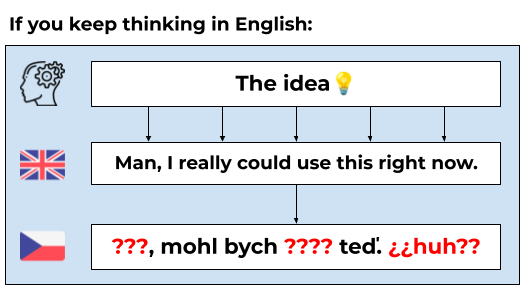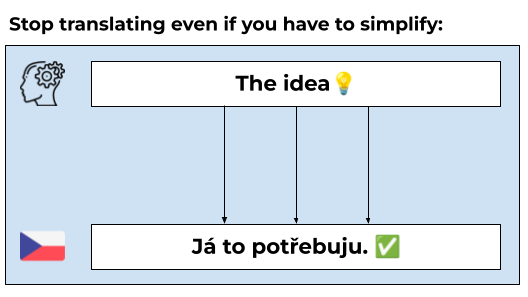How to learn effectively
In this article, we’ll explore tips for learning Czech effectively, covering both traditional and unconventional methods that can enhance your studies.
The tips contained in this article are as follows:
Relevant content
When learning a language, we often think that the more we learn, the better our skills will become. While this is partly true, the quality of what we learn matters much more than the quantity. What truly matters is what we learn. That’s where our first tip comes in.
Consider this: As a beginner in Czech, you might learn 200 specific words for various fruits, vegetables, clothes, and furniture. However, in everyday conversation, these specific terms are rarely used. They are single-purpose words with limited practical use.
Now, imagine learning 30 versatile words like want, need, city, thing, money, this, fruit. These words are used frequently in daily conversation. For instance, if you don’t know the word for “tangerine,” you can say, “I’d like three of these, please,” while pointing to the fruit. People will understand you easily.
Let's compare the two situations.
- Student A, as a complete beginner, has learned 200 very specific words for specific things. He is able to say sentences like "This is a dresser." or "This is a skirt."
- Student B, also a complete beginner, has only learned 100 general-purpose words. He may not be able to specifically name a skirt or a dresser, but he can now say complete sentences like "I need to buy this.", "I want to go to town tomorrow." or "I don't have any money right now."
Which student has put more effort into learning? And which student speaks better Czech now?
Less is often more. Most of what we say consists of just a few hundred words we use over and over again. When learning, it is good to focus on quality rather than quantity.
- If you are a beginner, learn universal words and the way to combine them into sentences.
- As you advance, you can learn more specific vocabulary, but remember to prioritize universal words.
Spaced repetition
When we learn new grammar, words, or concepts, we start to forget them if we don't use them regularly. That's why it's a good idea to review your knowledge once in a while.
Our memory retention follows the so-called forgetting curve, which decreases over time. Two major factors influence this: the number of repetitions of the knowledge and the timing of those repetitions.
- Number of repetitions. Both passive (reading/hearing) and active (recalling/using) repetitions are important. Active repetition is crucial for achieving fluency in a language. With each repetition, your memory retains the information for longer intervals.
- Timing of repetitions. Repeating information multiple times in a short period helps with short-term memorization, but spreading repetitions over time enhances long-term retention. The best time to review a word is right when you're about to forget it, and this interval lenghtens with each repetition.
While there is no precise way to identify the moment just before forgetting, modern technology using elements of AI can help you estimate and optimize review intervals.
The Czeched.cz app uses spaced repetition to optimize learning. It adapts to your performace, suggesting the best words and grammar to review at a given point of time. Are you new to Czeched.cz? Our app offers a comprehensive, free Czech course covering Czech grammar, vocabulary and skills like reading, speaking and listening. Check out our app right now!
To retain new information effectively, periodic review is essential. Key strategies include:
- Number of repetitions: After each repetition, your brain remebers the information for longer timee.
- Timing of repetitions: Long-term memorization is achieved by spreading out reviews. The optimal review time is just before forgetting the information.
Use technology, like our app, to estimate and optimize review intervals for better learning outcomes.
Diverse materials
Using varied resources is crucial for effective language learning. Diversify your study materials by including books, newspaper articles, podcasts, news, videos, radio, TV shows, movies, interviews, and conversations with native speakers. Additionally, it is good to follow a structured plan from a Czech teacher, a suitable textbook, or our app to teach you the language systematically.
This variety offers you a lof of different interesting topics and helps you practice all four language skills: listening, reading, writing, and speaking. It's essential to mix activities that target each of these skills.
Research shows that students who use diverse resources and practice different skills achieve better results and can adapt to unexpected situations more effectively. Since real-life language use involves various unpredictable scenarios, a variety of resources and activities will prepare you to respond appropriately.
Our website aims to provide the best and most varied learning materials, including resources within our app, podcast, and blog, where we offer additional tips for your language journey.
Using varied resources is essential for effective language learning. Diversify your materials by including books, articles, podcasts, news, videos, and conversations with native speakers to practice listening, reading, speaking and writing.
In addition, follow a structured plan from a teacher, a textbook, or an app, in order to improve your language skills systematically.
Avoid translating
To achieve fluency in Czech, avoid translating between your native language and Czech. Your brain is conditioned to think in your native language, so to speak Czech fluently, you must train it to think directly in Czech.
What's the problem with translating? When you try to translate sentences from your language into Czech while speaking or writing, you will always come across words or grammar that you don't know. And at that moment you get can stuck and not know how to continue.


Everyone learns most words in their first language by grasping the main idea of sentences and picking up unfamiliar words from context. When learning Czech, focus on understanding the main message using context clues, even if you don't know every word. This approach will improve your comprehension of Czech and help you learn lots of new words and phrases.
So how to learn words without translating?
- For physical objects, you can use pictures instead of words in your own language.
- For abstract concepts, you can use definitions in Czech, or example sentences providing enough context, in which you highlight the new word.
This method is also used by our application. Unlike other apps, the content of the Czeched.cz app is deliberately designed to avoid translating. Instead, users learn and practice new words using pictures or context, and the app builds students' ability to think in Czech. This characteristic is what distinguishes our app from others the most.
Space for a summary.
Don’t memorize grammar
Czech has one of the most complex grammars in Europe, with 7 cases that cause changes in word forms of nouns, adjectives, pronouns, and numerals. Each word can have up to 14 forms (7 in the singular and 7 in the plural), and there are over 20 paradigms (patterns for form changes) for nouns and adjectives alone. In short, it’s a lot.
However, no native Czech speaker becomes fluent by memorizing all these paradigms. If you had to recall every word’s paradigm, number, case, and form each time you spoke, you’d never speak fluently.
The same applies to Czech students. While understanding how cases work and using grammar tables can be helpful, relying on them for fluency is imposible because it slows you down when speaking.
Instead, focus on associating word forms with their functions or developing a sense of what "sounds right." For example, "Peter is" feels correct, while "Peter are" does not. This sensitivity develops through extensive reading and listening in Czech, allowing your brain to naturally grasp correct usage.
Our app supports this approach by offering short grammar explanations if needed, but you can learn effectively through examples and context alone. You can complete the course without needing to know terms like locative, accusative, or vocative.
Space for a summary.
Persistence and consistency
Studying for five minutes every day is more than an hour once a week. Aim to dedicate a few minutes every day to learning the language. This approach benefits you on two levels: First, it establishes a habit that makes continued learning easier. Second, regular exposure, even if brief, reinforces basic vocabulary and helps your brain retain it better through daily repetition.
Where can you find five minutes a day? Use idle moments, such as waiting for the bus. You can listen to a short podcast on your commute, read a news article during your lunch break, or complete a lesson in the Czeched.cz app.
To make language learning a regular, enjoyable habit, choose resources that interest you—like your favorite series dubbed in Czech or a blog on a topic you enjoy. Staying motivated can also be easier if you connect with Czech speakers interested in learning your language through language exchange apps.
Space for a summary.
Conclusion
That wraps up today’s tips. Remember that the key to language learning is to enjoy the process and have fun. If you resist learning Czech, progress will be challenging. Find interesting and enjoyable content to keep your motivation high.
Finally, don't forget to explore our app, which integrates all the methods discussed in this article and can significantly aid your Czech learning journey.
If you have any questions, feedback, or wishes, feel free to email us at info@czeched.cz, we'll be happy to respond as soon as possible.
Have a great day and we wish you good luck while studying Czech. See you next time!
